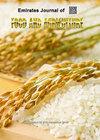Corn and cassava flours can replace wheat flour in gluten-free fish fingers
IF 0.7
4区 农林科学
Q3 AGRONOMY
引用次数: 0
Abstract
The aim of this work was to develop and to characterize fish fingers prepared with mechanically separated meat of hybrid surubim, with and without gluten. Four treatments were evaluated by varying the three steps of pre-dusting, battering, and breading. They have included wheat flour (T1), fishmeal (T2), corn flour (T3) or a blend of corn flour and cassava flour (T4). Characterization was carried out in terms of chemical, physical, microbiological, and sensory analyzes. Moisture content of the samples varied from 59.73% (T3) to 61.14% (T1), protein from 10.60% (T3) to 14.25% (T2), crude fiber from 11.00 to 11.42%, lipid from 4.42 (T1) to 10.91% (T2), and ash from 1.96% (T3) to 2.60% (T2). The highest breading yield (27.15%) coincided with the lowest shear strength (5.75 N) for T1. A darker color was observed for T2, which was prepared with fish meal. The average scores of the sensory attributes ranged from 6.12 to 7.50. All treatments presented acceptance indexes above 70%, except for the color attribute of T2. The purchase intentions for “certainly would purchase” and “possibly would purchase” were 82, 64, 72, and 72% for T1, T2, T3, and T4, respectively, with a rejection index ranging from 6 to 14%. It was concluded that treatments with corn flour (T3) and the mixture 1:1 of corn flour and cassava flour (T4) are good alternatives to replace wheat flour (T1), favoring celiac consumers.玉米和木薯粉可以代替小麦粉制作无麸质鱼柳
这项研究的目的是开发并鉴定用机械分离的杂交鲟鱼肉(含麸质和不含麸质)制作的鱼柳。通过改变预除尘、上浆和裹粉这三个步骤,对四种处理方法进行了评估。它们包括小麦粉(T1)、鱼粉(T2)、玉米粉(T3)或玉米粉和木薯粉的混合物(T4)。对样品进行了化学、物理、微生物和感官分析。样品的水分含量从 59.73%(T3)到 61.14%(T1)不等,蛋白质从 10.60%(T3)到 14.25%(T2)不等,粗纤维从 11.00%到 11.42%不等,脂肪从 4.42%(T1)到 10.91%(T2)不等,灰分从 1.96%(T3)到 2.60%(T2)不等。T1 的裹粉率最高(27.15%),而剪切强度最低(5.75 N)。用鱼粉制备的 T2 颜色较深。感官属性的平均得分在 6.12 到 7.50 之间。除 T2 的颜色属性外,其他处理的接受指数均高于 70%。T1、T2、T3 和 T4 的 "肯定会购买 "和 "可能会购买 "的购买意向分别为 82%、64%、72% 和 72%,拒绝指数在 6%至 14%之间。结论是,玉米粉(T3)和玉米粉与木薯粉 1:1 的混合物(T4)是替代小麦粉(T1)的良好替代品,有利于乳糜泻消费者。
本文章由计算机程序翻译,如有差异,请以英文原文为准。
求助全文
约1分钟内获得全文
求助全文
来源期刊

Emirates Journal of Food and Agriculture
AGRONOMYFOOD SCIENCE & TECHNOLOGY&nb-FOOD SCIENCE & TECHNOLOGY
CiteScore
1.80
自引率
0.00%
发文量
18
期刊介绍:
The "Emirates Journal of Food and Agriculture [EJFA]" is a unique, peer-reviewed Journal of Food and Agriculture publishing basic and applied research articles in the field of agricultural and food sciences by the College of Food and Agriculture, United Arab Emirates University, United Arab Emirates.
文献相关原料
| 公司名称 | 产品信息 | 采购帮参考价格 |
|---|
 求助内容:
求助内容: 应助结果提醒方式:
应助结果提醒方式:


